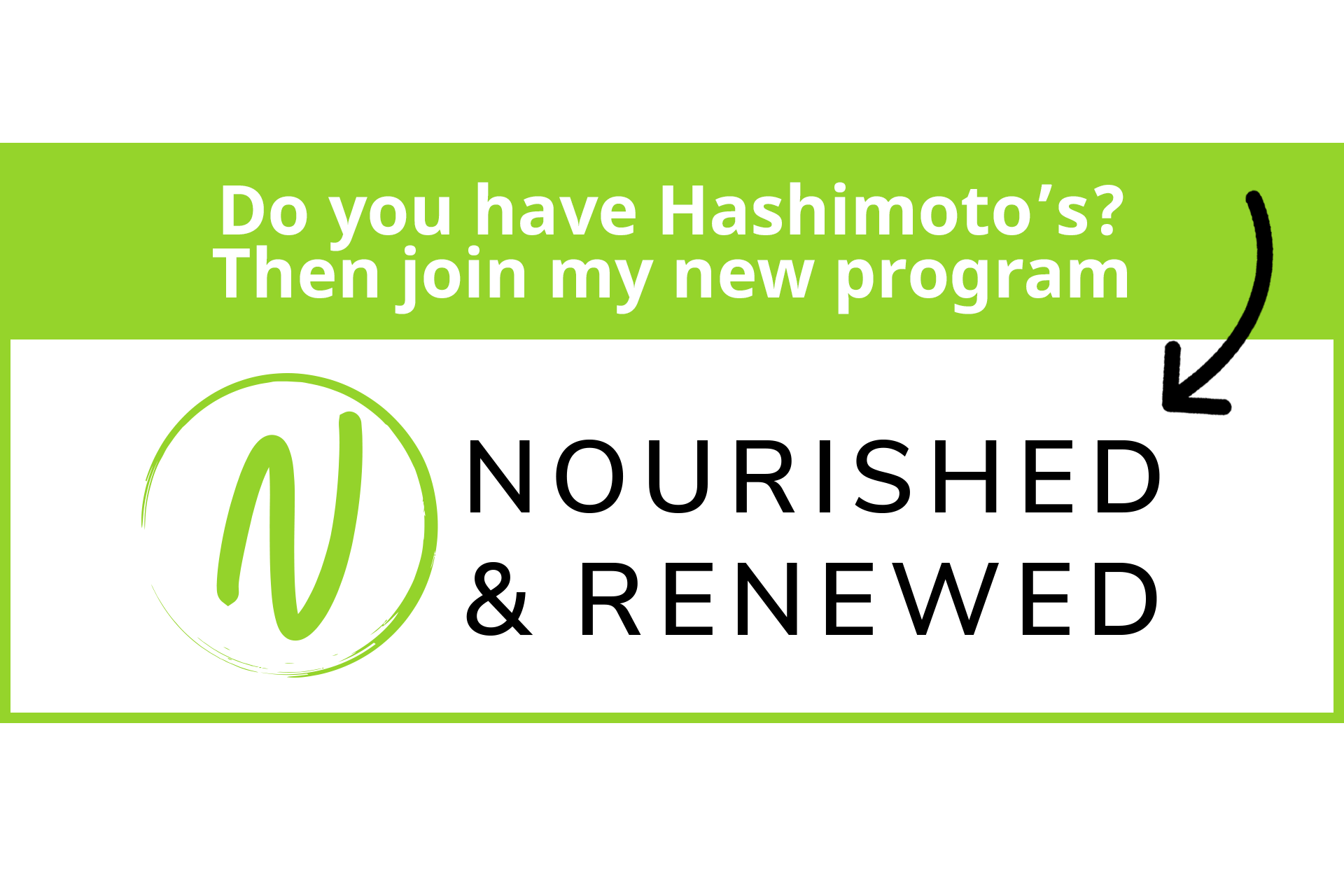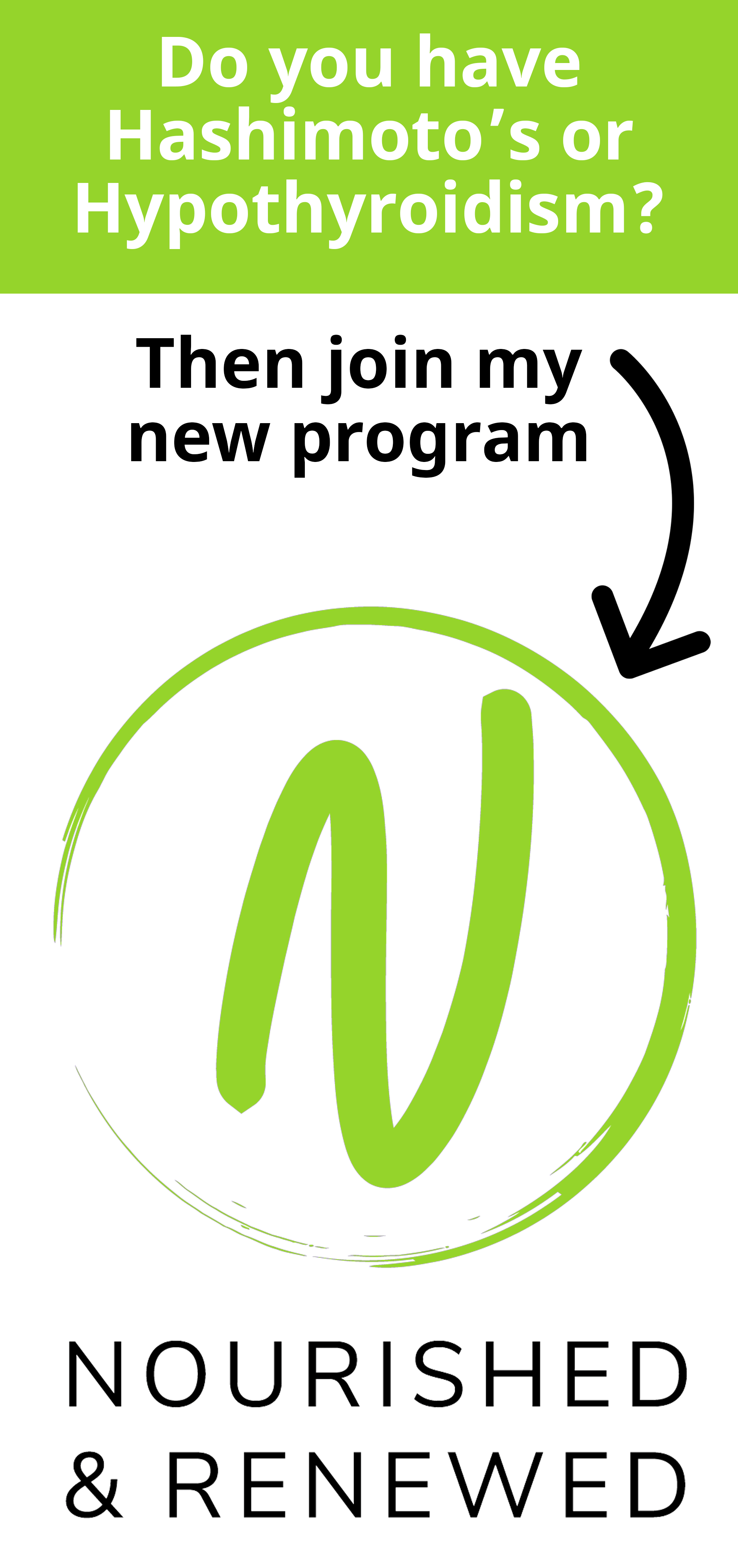We would all do just about anything to keep our kids safe and healthy. We make them wear helmets when they bike, seatbelts in the car and (safe, all-natural) sunscreen at the beach.
But what can we do when our child is facing a thyroid condition like Hashimoto’s or hypothyroidism?
It is natural to feel worried, to seek answers, to harness every resource possible and even to turn to Dr. Google and research for ways in which we can make it all better.
As someone who has battled Hashimoto’s disease for years, the future of my own children’s thyroid health is often at the forefront of my mind.
Luckily, because of the holistic approaches to thyroid health available today, we don’t have to feel powerless if faced with a diagnosis.
In working with many individuals and families over the years, I am very confident in the ways nutrition supports a healthy thyroid for both kids and adults.

Hypothyroidism and Hashimoto’s in Kids
Just like in adults, Hashimoto’s is the leading cause of hypothyroidism in children.
But what makes both Hashimoto’s and hypothyroidism different when it affects kids?
First let me briefly explain these thyroid disorders.
The thyroid is a gland in the neck (in the area of the Adam’s apple) that is triggered by the brain’s pituitary gland to secrete hormones.
These hormones function in the body in a number of ways for kids, including, supporting normal growth and development (like puberty), regulating metabolism, and keeping an even body temperature.
Hypothyroidism is when the thyroid does not adequately produce, convert and release the thyroid hormones.
Hashimoto’s disease is an autoimmune disorder in which the immune system attacks the thyroid gland tissue, thyroid hormones and even thyroid hormone receptor sites on cells within the body.
Hashimoto’s causes hypothyroidism because the attacked and damaged thyroid cannot function as well as a healthy, normal thyroid.

Causes of Hypothyroidism in Children
Besides Hashimoto’s, the other most common cause of thyroid disorders in children is what is called congenital hypothyroidism. This occurs in 1 in about every 3,000 babies born.
The infants are born with either a poorly functioning thyroid or even no thyroid at all.
It is believed this can be caused by a deficiency in iodine (a key nutrient for the thyroid), an issue with the pituitary gland or problems with an enzyme that produces hormones.
The good news is that this is usually detected very early on because a blood test to screen for congenital hypothyroidism is required in all 50 states.
Unfortunately, although Hashimoto’s affects 1 in 100 children and is a much more common cause of hypothyroidism, screening for Hashimoto’s is not common.
In fact, just like in adults, missed diagnosis, mis-diagnosis and confusion around symptoms can be part of the journey to discovery of the illness and it may take time before the right physician does the right tests to get to the bottom of things for your child.
There are many tell-tale symptoms that alert physicians and pediatricians when there may be a thyroid issue. And, for parents, being aware of certain signs can help you be proactive if you suspect your child needs to be evaluated.

Signs of Hypothyroidism in Children
With babies and even with young kids, it can be hard to determine what they are feeling and experiencing, and their ability to communicate with us if they are feeling “off” cannot be relied on.
Therefore, we can’t always look for the same symptoms of thyroid dysfunction in kids as we do in adults, even though some may be the same.
Here are common signs in children of hypothyroidism:
- Slow growth (may cause short limbs)
- Delayed tooth development
- Impaired learning and school performance
- Lack of energy or inactivity
- Feeling cold all the time
- Unexplained weight gain
- Constipation
- Dry skin
- Delayed puberty in teens
- Absent or irregular menstrual periods in teenage girls
- Droopy eyelids
- Slow speech
- Hoarse voice
- Puffy or swollen face
- Hair loss
Hashimoto’s Risk Factors
The truth is, there isn’t one cause of Hashimoto’s.
As parents, we can’t help but look to our own life experiences when seeking health for our kids. When faced with a thyroid condition in our kids, we may even wonder if there is something we could have done better or differently.
Yes, genetics is a factor, so if you or your partner suffer from Hashimoto's or hypothyroid, there is a higher risk for your biological children.
But other risk factors can include:
- A chromosomal disorder like Down syndrome, Williams syndrome or Turner syndrome
- Iron deficiency or an overabundance of iron
- Thyroid injury
- Head or neck exposure to radiation (such as for cancer treatment)
Because Hashimoto’s is an autoimmune disorder, other autoimmune conditions also increase the risk of Hashimoto’s. This can include Type I Diabetes and Celiac.
Inversely, a diagnosis of Hashimoto’s can mean your child has a higher risk of developing a secondary autoimmune disorder.
Just as women have a higher risk than men for Hashimoto’s, girls are more likely to suffer from it than boys are.
Nutritional risk factors such as deficiencies, leaky gut, and food intolerances can also be evaluated.

Testing for Hashimoto’s & Hypothyroidism In Children
It’s helpful to know the signs and risks, but only by getting your child tested with a standard thyroid lab panel will you know for sure if they have a thyroid disorder.
But, wait, just to make things a little trickier, there are not steadfast guidelines or reference ranges for children in the same way there are for adults regarding thyroid hormones.
The most common indicator that doctors will look at is the level of Thyroid Stimulating Hormone (TSH), which in the hormone the pituitary gland uses to trigger the thyroid.
In children, these TSH levels are generally considered healthy levels:
- 0-4 days: 1.6-24.3 mU/L
- 2-20 weeks: 0.58-5.57 mU/L
- 20 weeks-18 years: 0.55-5.31 mU/L
When TSH is higher than these numbers, hypothyroidism may be considered and doctors may test for other hormones, such as T3 and T4, the hormones made and converted by the thyroid.
If these are below normal levels in addition to high TSH, your children may at that point receive a hypothyroidism diagnosis.
To know for sure if the cause of the hypothyroidism is autoimmune in nature, your child would need to be tested for thyroid antibodies, the cells that the immune system uses to attack the thyroid.
High levels of these antibodies in the blood are a sign that the gland is being attacked by the immune system in Hashimoto's. The two antibodies commonly measured are thyroglobulin antibodies (TgAb) and thyroid peroxidase antibodies (TPO).

How to get the right Hashimoto's and Hypothyroidism Diagnosis
I suggest you read my complete guide to understanding all about Hashimoto’s and hypothyroidism as well as the recommended thyroid testing to help you get proper diagnosis for your child.
If you are having trouble communicating the need for these tests with your child’s doctor, or if insurance approval is standing in the way, you can order thyroid lab tests directly.
I suggest the following lab panel (that includes all of the above lab values) for the clients I work with remotely: Extended Thyroid Test for Hashimoto’s Thyroiditis. It costs just $129 but is valued at over $400.
The good folks at True Health Labs allow you to directly order labs that make the most sense for your child’s health condition.
If you do order these labs, be sure to take them with you to your next pediatrician appointment.
Show them that you are willing to do what it takes to get the correct information for the best treatment plan possible for your child.

Long-term Effects of Untreated Hypothyroidism On Kids
It can be easy to feel overwhelmed with a diagnosis and want to stick your head in the sand and hope the problem goes away.
But, of course, it’s never that simple and ignoring the problem can lead the bigger problems down the road.
When untreated, hypothyroidism, regardless of the cause, can lead to goiters in the neck (this is the thyroid’s response to under-activity), impaired growth, mental retardation, hearing loss or impairment, loss of permanent teeth, impaired hair and nail growth, and behavioral issues.
Because the thyroid plays a large role in energy metabolism, a child with an underactive thyroid can show signs of forgetfulness, lethargy and trouble with concentration.
Untreated Hashimoto’s also presents the co-morbidities of autoimmune illness - the likelihood of developing secondary or tertiary autoimmune conditions increases over time.
In rare cases, the immune system of a child with Hashimoto's can cause inflammation in the brain and nervous system. Symptoms can include strange behavior, confusion, muscle twitching, and seizures.
The good news is that with proper testing, diagnosis and treatment - as thyroid hormone levels are improved, behavior problems often right themselves.
Unfortunately, however, kids may not be able to make up lost growth or teeth/hair/hearing impairments even after treatment with medication.

Managing Hashimoto’s For Your Child
I wish I could tell you that there is a cure for Hashimoto’s. But as of now, there are only ways to manage it through medication and dietary and lifestyle changes.
One of the best things you can do for your child after a diagnosis, and in some cases even before, is to find a doctor who knows hormones backwards and forwards and will be open to the paths you may choose for your family’s health.
I recommend looking for an endocrinologist, DO (Doctor of Osteopathic medicine), family practice doctor or integrative medicine doctor.
You may also wish to seek out a holistic team of specialists to help you advocate for the best treatment for your child.
In my practice, I suggest complementary alternative modalities such as acupuncture, naturopathic medicine and of course - holistic nutrition therapy.

Thyroid Medication For Children
It can be scary to think of putting your child on a medication indefinitely, but the right medication can change the quality of life for your kid and your whole family.
And if you think of it as just one piece of the health puzzle, you may find that medication fits perfectly into your plan.
Just know that it can take time and a bit of tweaking to find the right medication at the right dosage.
Because there are many types of thyroid medications, I’ll reiterate here that you ought to check out my Complete Guide to Understanding Hashimoto’s, Hypothyroidism and Thyroid Testing to learn more.
Being prepared to have a thorough conversation with your child’s doctor is an important step.
You can prepare for your next physician appointment by downloading my FREE Hashimoto’s Checklist. These suggestions work for both adults and kids who are seeking proper medical attention for a thyroid condition.

Nutrition for Hashimoto’s
Now for the good news - the right nutritional choices can help the body manage Hashimoto’s by supplying it with the nutrients it needs to support the thyroid naturally.
What to Avoid
There are foods that can aggravate hypothyroidism and the antibodies that are part of the Hashimoto’s process. You can read more about this on my blog post Eat to Lower Anti-Thyroid Antibody Levels.
Many of these can cause inflammation, throw off our natural gut flora (good bacteria) and trigger additional food sensitivities.
All of this leads to a more heightened immune system, which can attack the foods that are just trying to nourish us, or the body itself.
But, to name a few, you will want to pay attention that your child is not consuming too many of the following aggravating foods:
- Junk foods, fast foods and heavily processed foods - these are loaded with food additives, preservatives, chemicals, etc.
- Conventionally-raised meats and dairy which may have hormones added and can disrupt the overall endocrine system
- Sugar-rich foods which can create candida overgrowth in the body (candida is a bacteria/yeast that when out of balance can compromise thyroid health)
- Gluten - your child’s body perceives this protein found in wheat and other grains as “antigenic”, which leads to inflammation and may exacerbate thyroiditis
What to Consume
Here’s the best news all day: your child will feel their very best with a clean, home-cooked food plan prepared with high-quality ingredients.
Here are a few critical nutrients (and the foods which supply them) for thyroid health:
- Oysters, red meat, mushrooms, seeds, beans and spinach are a great source of zinc, which is crucial for thyroid function
- Iodine is an amazing thyroid booster and is found in seafood, dairy and eggs
- Those with thyroid dysfunction are more likely to be deficient in vitamin D, which is found in fish, eggs, mushrooms… and sunshine!
- Magnesium helps convert thyroid hormones to an active form. Dark leafy greens, nuts, seeds and grains are an excellent source of magnesium.
- Phytonutrients - think of this as the “magic” found in foods – help your child eat the rainbow of colors available in plant foods! Bright green leafy veggies, orange peppers and melon, yellow squash, purple cabbage, red radishes and berries, and so on!
- Animal meat is rich in vitamin B12 and iron (as well as many other vitamins and minerals) which are key in converting the T4 thyroid hormone (whether in its natural form or synthetic like Synthroid) to the T3 hormone. High quality animal protein is of utmost importance so get to know your local butcher!
Dealing With Food Sensitivities
Food sensitivity can exacerbate autoimmune disorders like Hashimoto’s because they trigger the immune system.
What foods these can include vary greatly for each person but the most common food sensitivities and intolerances are to:
- Lactose (a sugar found in dairy)
- Gluten (a protein found in wheat, rye and barley)
- Casein (a protein found in dairy)
- Eggs
- Soy
- Fish and shellfish
- Peanuts and tree nuts
Some food additives, like MSG and sulfites, are also problematic for some people. It can be hard to determine what foods aren’t working for your child.
One possible solution is an elimination diet, but it takes time and commitment and can be difficult for kids. Another is to keep a food journal in order to track foods and reactions, keeping in mind that some reactions can take up to 72 hours.
For kids with food reactions and known autoimmune illness, I suggest the Food Inflammation Test (FIT) which is an add-on option with my Child Advanced Program.
This test takes the guess-work out of food modifications and helps get your child on a faster path to feeling better with Hashimoto’s.

Stress
For kids these days, stress has a huge impact on their overall health. Stress has been shown in research studies to negatively impact thyroid function and is known to be a factor in many autoimmune diseases.
Many of my adult and children (especially teens!) clients report that stress management plays a large role in the management of their thyroid health.
Can you assess the stress levels your child may be dealing with?
What ways can you implement some stress-free time to help them best cope with their feelings, health condition and any other factors in their life which may be upsetting their life balance?
I suggest nature walks around your neighborhood, deep belly-breathing, yoga is super fun for kids, and even just good old fashioned laughter, play time and rest time - these are all good for our kids!

Doing What’s Best For Your Kid
We all want the best for our children. We want them to be safe, to be healthy and most of all, to be happy.
If this article only scratched the surface of what you may be dealing with in supporting your child’s health, schedule a call with me for a customized nutritional program.
For parents struggling with the complexities of their child’s thyroid health and needs, a one-on-one nutritional program is the best bet for ensuring the nutrient needs of your precious child are addressed fully.
Additionally, I have put together a Hashimoto’s self paced online program that is supportive for parents and caregivers of kids with Hashimoto’s.
It’s a 30 day self-paced online program which
- teaches you about the thyroid
- empowers you to be your child’s best health advocate
- helps you speak confidently with doctors
- guides you to implement dietary changes
- suggests supplements that may support your child’s overall health
I recommend you check out Nourished and Renewed with Hashimoto’s.
We may not be able to choose the body they have to grow up in, but we can certainly help them nourish that body and support it in ways we hope will let them flourish.
I am also here to help!





